Run a free Hillsborough County warrant search today using this resource for guidance. This action is possible because warrant records are in the public sphere due to Florida’s Sunshine Laws and the similar federal Freedom of Information Act (FOIA).
Citizens can seek warrant data from county, state, and sometimes local jurisdictions at no cost. They may, however, have to pay a nominal cost for physical copies.
This article provides helpful resources such as aggregate links and contact information to aid searchers in retrieving these records via online databases and various offices in Hillsborough County, Florida. The final section of this resource also offers guidance on resolving warrants if applicable.
Performing a Hillsborough County Warrant Search: A Synopsis
To search for warrant records, public agencies will need patrons to provide information about the subject of the search.
First and foremost, interested persons cannot retrieve warrant records without knowing the full names of the defendant—knowing a partial name may sometimes be sufficient, but it would mean scrolling through hundreds of records of other persons with a similar name.
Equally important is to know which county issued the warrant or where the subject lives. This will permit the searcher to look in the county of concern; otherwise, the task becomes laborious.
Some agencies may require the subject’s date of birth (DOB); still, having more information, such as the sex and race of the defendant, can help refine the search. Furthermore, the query becomes easier if the searcher knows the warrant number.
In Hillsborough County, there are two primary agencies that are custodians of warrant records; the Clerk of Court & Comptroller and the Sheriff’s Office.1, 2 Patrons may seek information on wanted persons through electronic means such as online databases, mail, phone and in-person requests.
The county has several types of warrants including search, arrest and bench apprehension orders. These are detailed in the sections below.
Moreover, some warrant types are not public record. For example, information on active and outstanding search warrants is released to the public once executed. Revealing this information will deter investigations and alert suspects to discard incriminating evidence.
How To See Who Has an Outstanding Warrant in Hillsborough County Florida
Interested parties can seek information for themselves or someone else from two county agencies, the Hillsborough Clerk of Court & Comptroller and the Sheriff’s Office. Both agencies have provided methods to find these records online; searchers may also request information through mail, phone or by visiting the offices.
Find Out if Someone Is Wanted via the Clerk of Court: The Hillsborough Clerk of Court & Comptroller is the custodian of court records from the county’s Thirteenth Judicial Court.3, 4
Patrons can conveniently view warrant records online from court documents using the Hillsborough County Case Search Tool (HOVER) for free.5 Users can view court records using several criteria, including case number, party name, court and case type, etc.
Select the case category (criminal, civil, traffic, etc.) under which the warrant may have been issued. The “Case Types” drop-down menu allows users to select the type of case, such as felonies, misdemeanors, search warrants, etc. Make the appropriate selection according to the data being sought.
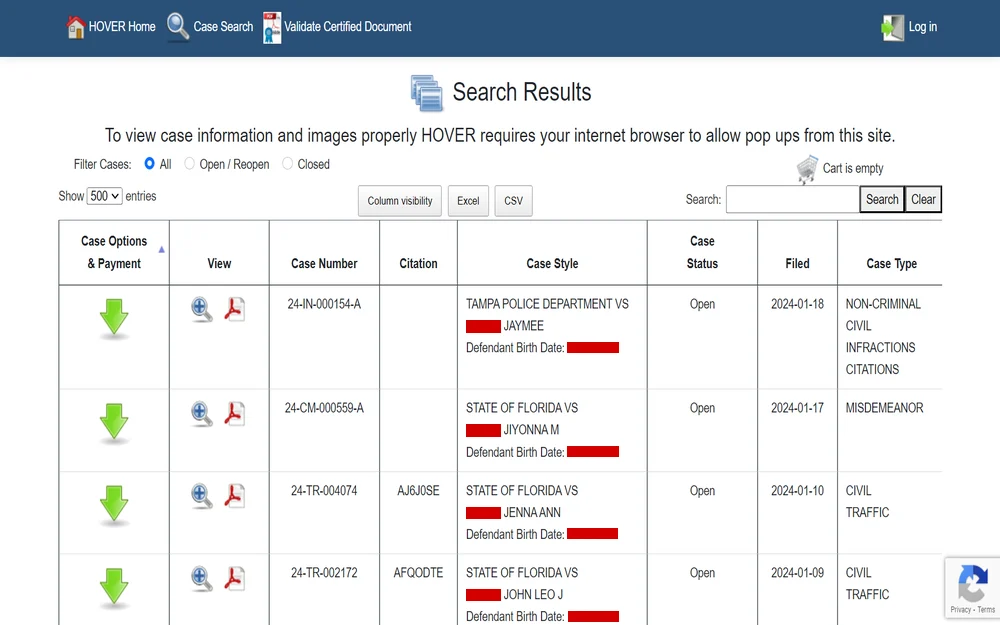
Records on wanted persons will display information such as date filed, warrant number, judge presiding and the apprehension order’s reason. It is possible to order electronically certified copies of warrant records online under the case details—this applies only if the requester needs certified copies, which is rare.6
Furthermore, citizens can elect to request court records by mail, in person, or by email at [email protected]. Information on any charges that may be incurred is on this fee schedule. The mailing and physical address appear below.
Hillsborough Clerk of Court & Comptroller
601 East Kennedy Boulevard. 13th floor
Tampa, Florida 33602
If the patron feels they are exempt from fees and costs, they may make their petition for copies using this request copies of court documents form.7 Lastly, citizens request public records if they cannot find the records they are looking for using the above mentioned methods.
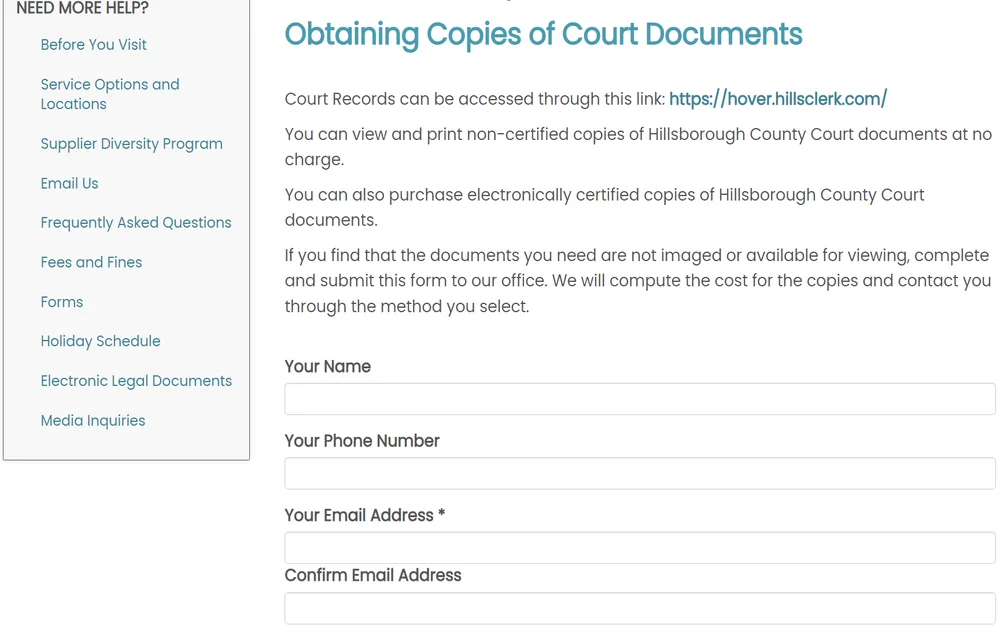
Call or email the Hillsborough Clerk of Court & Comptroller for any questions and inquiries at 813.284.2131 and [email protected] regarding requesting these public records.8
Acquire Warrant Records Through the Sheriff’s Office: The Hillsborough County Sheriff’s Office serves warrants originating from the courts. This office provides a convenient free online tool to find wanted persons in Hillsborough County.9 Users can search the database using a valid warrant number (if known), full name, race, sex and date of birth.
Search results will have detailed information on the warrant, including:
- Full Names
- Warrant Number
- Expiration Date
- Physical Descriptors (Race, Sex, Weight, Eye Color etc.)
- DOB
- Address of the Defendant
- Charges
- Court & Case Number
- Charges Information (Description, Bond, Case Number etc.)
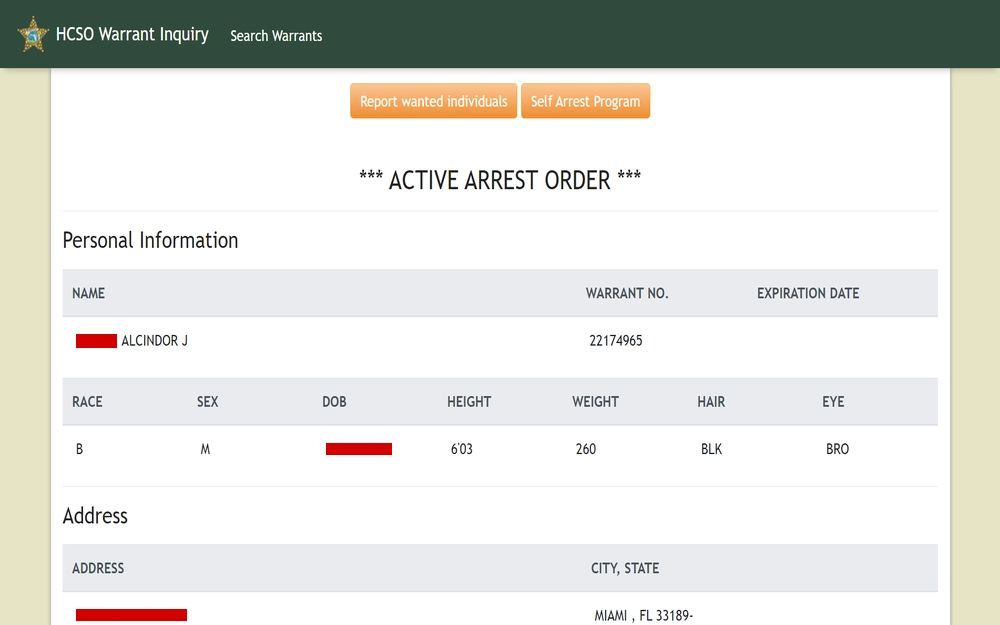
The Sheriff’s Office advises not to rely solely on this information but to contact the office by calling the main switchboard at 813.247.8000 to be directed to the right department or make an in-person visit to these Sheriff’s Office locations or the Operations Center, whose address is below.
It should be noted individuals with outstanding warrants can be taken into custody should they choose to visit the Sheriff’s Office.
Hillsborough County Sheriff’s Office
Sheriff’s Operations Center
2008 East 8th Avenue
Tampa, FL 33605
To report wanted persons and submit tips anonymously to the Sheriff’s Office, call 813.247.8200—never approach the fugitive or take action.10 Residents wanting to uncover more records on anybody nearby can check out the instructions for looking up Hillsborough County arrests and view countywide mugshots online.
Search Warrant Records in Local Jurisdictions: Interested parties have another resource for information on wanted persons: local municipalities and police departments. There are several cities in Hillsborough County; the most populated cities are Tampa, Plant City and Temple Terrace.
The City of Tampa advises interested parties to call the Hillsborough County Sheriff’s Office to find warrant information. Citizens in Temple Terrace can turn to the police department’s services division to request warrant records.11
To showcase a search for warrant records in cities, Plant City will be used. Plant City Police Department has a records unit that citizens can contact to request warrant information via local record checks.12 These cost $3.00 per subject search regardless of the result; if requestors need the copies certified, the cost is an extra $1.00. The records will reflect only those generated by the city.
Requests are done in person or through written requests, including a daytime contact number, mailing address, and check for the costs. Visit the Records Unit Monday to Friday, 7 AM to 5 PM. The mailing and physical address appear below. For any questions, call 813.757.9200, ext. 2226.
Plant City Police Department
1 Police Place
Post Office Box 4709
Plant City, FL 33566
How To Check Information About Warrants Throughout All of Florida: Statewide Lookups
The search for warrants can cross county lines and cover the entire state—citizens have one option to find wanted persons: the Florida Department of Law Enforcement (FDLE).
FDLE maintains a database of warrant information reported by law enforcement agencies in the state and authorized for public release.13 This database is free to utilize, and users can query it using names of the defendant (including nickname), race, sex, and DOB.
The information displayed on each subject’s records appears below.
- Full Names (and Nicknames)
- Mugshot (Photograph) if Available
- Aliases
- Offense
- Reporting Agency
- Date of Warrant
- DOB
- Race
- Sex
- Physical Descriptors (Hair and Eye Color, Height, Weight etc.)
- Occupation
- Last Known Address
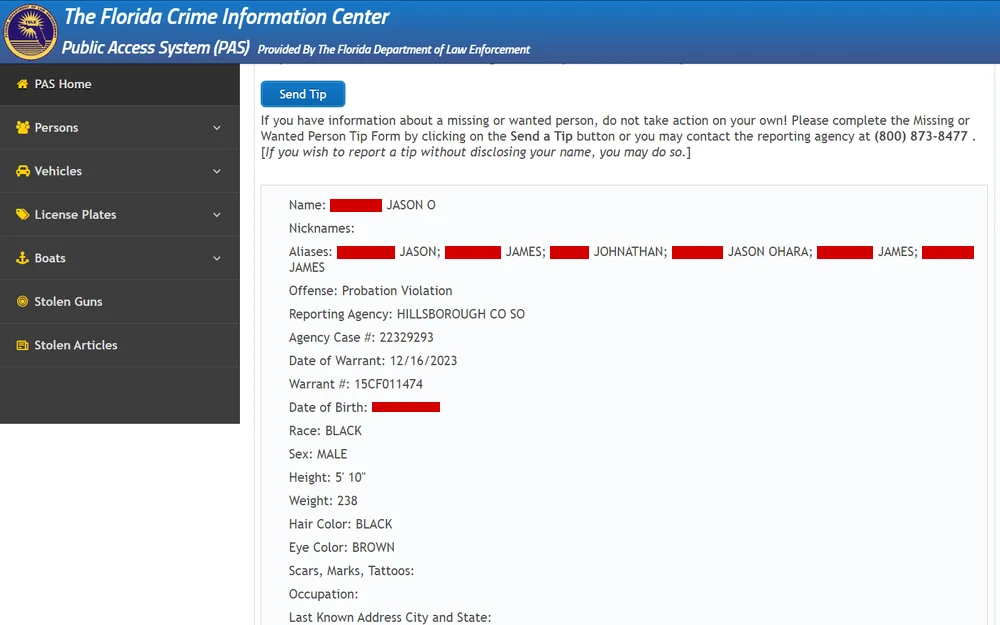
The record also contains a button where vigilantes can send a tip if they are aware of the fugitive’s whereabouts.
In addition, the Florida Department of Law Enforcement (FDLE) permits citizens to perform public record requests as an alternative to finding warrant records online. These written requests are in writing and can be performed in person or by mail at the address below. See this guide about record requests and associated costs.14
For more information and to confirm the information on the database, contact the FDLE by calling 850.410.7000, mailing or visiting the headquarters in Tallahassee. Their email address is [email protected].
Florida Department of Law Enforcement (FDLE)
2331 Phillips Road
Tallahassee, FL 32308
Mailing Address
Post Office Box 1489
Tallahassee, FL 32302-1489
Tip: Go through the links and step-by-step guidance in the overview of accessing all Florida warrant records for additional insights and explanations.
Types of Warrants: Their Definitions & Reasons for Issuance
As briefly mentioned, several types of warrants exist in Florida and Hillsborough County, including search, bench, fugitive and capias apprehension orders. A warrant is a written order (writ) that permits law enforcement officials to take an action such as arresting someone, searching and seizing property.15
Warrants infringe on a person’s right to be free, safe, and secure as per the Fourth Amendment Constitution of the U.S., and hence, judges can only issue and authorize these orders upon receiving documentation showing probable cause.16
Arrest warrants are the most common form of writs in Hillsborough County and are of various types, including bench, alias, capias and probation and parole apprehension orders. Arrest warrants give law enforcement officers the authority to take persons into custody.
Judges issue search warrants upon receipt of probable cause documents from law enforcement agencies, allowing the police to sweep properties in search of evidence and seize them if necessary.
Bench warrants are issued by the judge while on the bench, as the name implies, to defendants who have failed to attend a court appearance. Conversely, judges authorize alias warrants for the arrest of defendant’s who have not appeared in court before a plea has been entered or have failed to respond to a citation by mail or in person.
Capias warrants are a type of apprehension order that the courts furnish to guilty defendants either by plea or court appearance and have subsequently failed to pay their fine obligation due to their conviction. Civil capias warrants are issued for defendants of civil cases who repeatedly do not conform to court orders.
Drivers who have unpaid fines can have traffic warrants issued against them. Parents who do not keep up with child maintenance payments will receive child support warrants.
Convicted offenders under community supervision who fail to keep the conditions set upon them, like reporting to their offices or committing crimes, can be furnished with parole and probation warrants.
Magistrates and judges may issue fugitive warrants out of state for suspects that may be in Hillsborough County. Lastly, the Governor can authorize Governor warrants—these apprehension orders are issued to suspects who have committed crimes outside Florida. These apprehension orders allow for the transportation of suspects out of state.
How To Respond to an Outstanding Warrant in Hillsborough County FL
Ignoring a warrant will not make the problem go away and means that the defendant will always be concerned about getting arrested—they can take measures such as paying outstanding fines or obtaining the services of a lawyer.
Upon finding and confirming active warrant information on an acquaintance, citizens should inform them because often, they may be unaware of the apprehension orders against them. In cases where a warrant is discovered on a stranger, it is crucial to inform law enforcement agencies, particularly if the defendant is a fugitive wanted for serious crimes.
Citizens can notify the Hillsborough County Sheriff’s Office at 813.247.8200 or submit anonymous tips online.17 They may also download the Sheriff’s Office app on Android or iPhone and make a report or text the “CTYTIP” and the tip to 847411
Vigilantes can also contact state agencies to notify them of fugitives and wanted persons; particularly, they may get in touch with the Florida Department of Law Enforcement (FDLE) by calling 850.410.7000 or anonymously reporting suspicious activity online.18
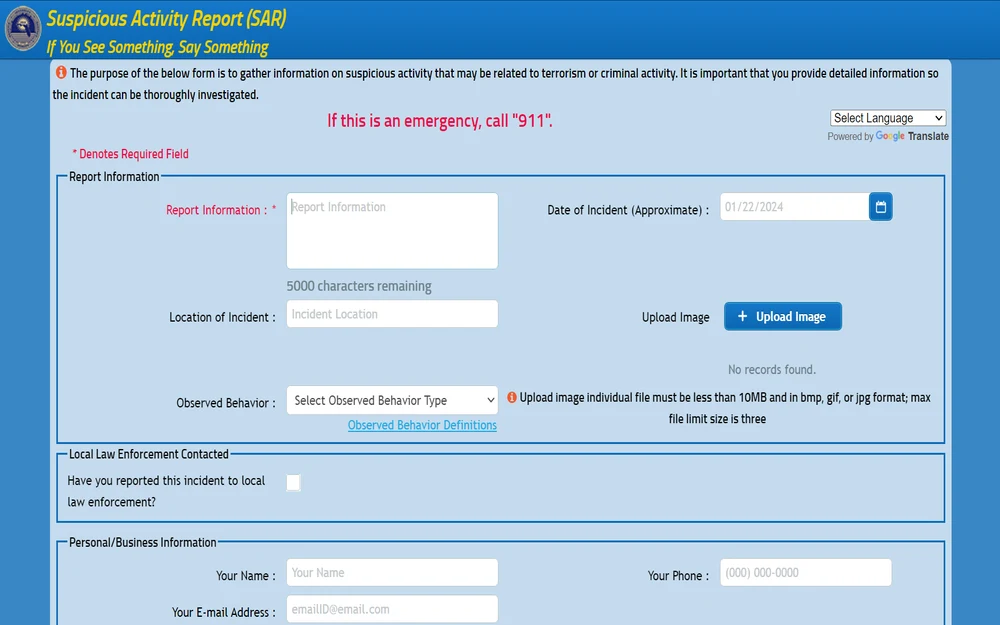
Warrants are outstanding and active until a search is conducted or someone is placed into custody. Defendants may also resolve and quash warrants using the ways seen below.
It is always advisable to enlist the services of legal counsel as they will help their clients navigate the law regarding their apprehension. They will be present at their interrogation and can also help have the charges dismissed or reduced. This is helpful if the defendant is accused of serious crimes.
In addition, lawyers can get a warrant to be recalled and quashed, especially if the courts have issued them in error.
Paying court fines or amounts due, such as child support payments and traffic tickets, will resolve warrants.19 Contact the Hillsborough Clerk of Court & Comptroller by calling 813.284.2131 or emailing [email protected].
Defendants may also visit the Hillsborough Clerk of Court at these locations to inquire how they can clear fines. They may also re-schedule court dates to cure apprehension orders such as bench warrants.
Hillsborough Clerk of Court & Comptroller
601 East Kennedy Boulevard. 13th floor
Tampa, Florida 33602
Lastly, defendants turning themselves in to law enforcement agencies can only resolve some warrants. Doing so at the agency with the warrant against the defendant is imperative to allow faster processing and release.
The Hillsborough County Sheriff’s Office has a Self-Arrest Program for every level of charge as long as there is a bond amount associated with the charge This program allows defendants to resolve warrants more conveniently. Bondable misdemeanors and felonies can be administered with this program.
Other charges are handled through the Orient Road Jail.20
Call the Hillsborough County Sheriff’s Office Self-Arrest Program at 813.247.8460, Monday to Friday, 9:00 AM to 3:30 PM and surrender at the address before. Ensure to have the warrant number and ID. Before doing this, contact an attorney, inform family members and enlist the services of a bonds agent to arrange bail.
Running a Hillsborough County warrant search allows citizens to locate information on wanted persons; this article provides resources such as aggregate links to official channels to facilitate the lookup.
References
1Hillsborough County Clerk of Court & Comptroller. (n.d.). Service Options and Locations. Retrieved January 23, 2024, from <https://www.hillsclerk.com/About-Us/Service-Options-and-Locations>
2Hillsborough County Sheriff’s Office. (n.d.). Directory. Retrieved January 23, 2024, from <https://www.teamhcso.com/Home/Directory>
3Hillsborough County Clerk of Court & Comptroller. (n.d.). About Us. Retrieved January 23, 2024, from <https://www.hillsclerk.com/About-Us>
4Thirteenth Judicial Circuit Court of Florida. (n.d.). Contact Us. Retrieved January 23, 2024, from <https://www.fljud13.org/ContactUs.aspx>
5Hillsborough County Clerk of Court & Comptroller. (n.d.). HOVER – Hillsborough Online Viewing of Electronic Records. Retrieved January 23, 2024, from <https://hover.hillsclerk.com/>
6Hillsborough County Clerk of Court & Comptroller. (n.d.). eCertify. Retrieved January 23, 2024, from <https://www.hillsclerk.com/Records-and-Reports/eCertify>
7Hillsborough County Clerk of Court & Comptroller. (n.d.). Request Copies of Court Documents. Retrieved January 23, 2024, from <https://www.hillsclerk.com/Preorder-Case-Files/Request-Copies-of-Court-Documents>
8Hillsborough County Clerk of Court & Comptroller. (n.d.). Public Records Request. Retrieved January 23, 2024, from <https://www.hillsclerk.com/Records-and-Reports/Public-Records-Request>
9Hillsborough County Sheriff’s Office. (n.d.). Warrant Inquiry. Retrieved January 23, 2024, from <https://webapps.hcso.tampa.fl.us/WarrantInquiry>
10Hillsborough County Sheriff’s Office. (n.d.). Tip 411. Retrieved January 23, 2024, from <https://www.teamhcso.com/Section/329d67fb-e12d-4f25-abb1-e13b834db244/tip-411>
11The City of Temple Terrace. (n.d.). Services Division. Retrieved January 23, 2024, from <https://www.templeterrace.gov/314/Services-Division>
12City of Plant City Police Department. (n.d.). Records Unit. Retrieved January 23, 2024, from <https://www.plantcitygov.com/police/page/records-unit>
13Florida Department of Law Enforcement. (n.d.). Wanted Persons. Retrieved January 23, 2024, from <http://pas.fdle.state.fl.us/pas/restricted/PAS/person/WantedPersons.jsf>
14Florida Department of Law Enforcement. (n.d.). FDLE Guide to Public Records. Retrieved January 23, 2024, from <https://www.fdle.state.fl.us/Open-Government/Documents/FDLEGuidetoPublicRecords.aspx>
15Legal Information Institute. (n.d.). Warrant. Retrieved January 23, 2024, from <https://www.law.cornell.edu/wex/warrant>
16Florida Legislature. (n.d.). The 2023 Florida Statutes: Section 901.15. Retrieved January 23, 2024, from <http://www.leg.state.fl.us/Statutes/index.cfm?App_mode=Display_Statute&URL=0900-0999/0901/Sections/0901.15.html>
17Citizen Observer. (n.d.). Submit a Tip. Retrieved January 23, 2024, from <https://www.citizenobserver.com/tips/new?alert_group_id=123>
18Florida Department of Law Enforcement. (n.d.). Sexual Offender and Predator System. Retrieved January 23, 2024, from <https://sar.fdle.state.fl.us/sar/public/publicSarEnglish.jsf>
19Hillsborough County Clerk of Court & Comptroller. (n.d.). Criminal Traffic Tickets. Retrieved January 23, 2024, from <https://www.hillsclerk.com/Traffic/Traffic-Department/Traffic-Tickets/Criminal-Traffic-Tickets?textHighlight=warrant&exp=true>
20Hillsborough County Sheriff’s Office. (n.d.). Department of Detention Services. Retrieved January 23, 2024, from <https://www.teamhcso.com/Section/708bcd1f-1d7b-4029-8428-39aac7343910/Department-of-Detention-Services>
